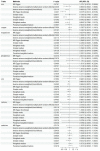Genetic Causal Associations between Various Serum Minerals and Risk of Depression: A Mendelian Randomization Study
- PMID: 38863045
- PMCID: PMC11188766
- DOI: 10.62641/aep.v52i3.1637
Genetic Causal Associations between Various Serum Minerals and Risk of Depression: A Mendelian Randomization Study
Abstract
Background: Previous observational studies have discovered a connection between depression and mineral status. Confirming this potential connection is challenging due to confounding factors and potential reverse causality which is inherent in observational studies.
Materials and methods: We performed a Mendelian randomization (MR) analysis to estimate the causal association of serum minerals with depression. Leveraging summary-level data on depression, a genome-wide association study (GWAS) was applied. The data on serum minerals were collected from the FinnGen Biobank database. MR assessments representing causality were produced by inverse-variance weighted approaches with multiplicative random and fixed effects.
Result: Sensitivity analyses were performed to validate the reliability of the results. A noteworthy correlation emerged between serum zinc levels and reduced risk of depression. An odds ratio (OR) of 0.917 for depression associated with a one standard deviation increase in serum zinc levels (OR = 0.968; 95% CI = 0.953-0.984, p = 1.19 × 10-4, random effects model inverse variance weighted (IVW)); (OR = 0.928; 95% CI = 0.634-1.358, p = 0.766, MR Egger). Sensitivity assessments supported this causation. However, the risk of depression did not exhibit an association with other minerals.
Conclusions: In summary, a higher zinc concentration is causally associated with a reduced depression risk. This MR outcome may assist clinicians in the regulation of specific mineral intake, particularly for high-risk patients with serum zinc deficiencies.
Conflict of interest statement
The authors declare no conflicts of interest.
Figures


Similar articles
-
Revealing the Causal Relationship Between Differential White Blood Cell Counts and Depression: A Bidirectional Two-Sample Mendelian Randomization Study.Depress Anxiety. 2025 Mar 3;2025:3131579. doi: 10.1155/da/3131579. eCollection 2025. Depress Anxiety. 2025. PMID: 40225727 Free PMC article.
-
Causal associations between liver enzymes and diabetic microvascular complications: A univariable and multivariable Mendelian randomization.PLoS One. 2024 Jan 17;19(1):e0296894. doi: 10.1371/journal.pone.0296894. eCollection 2024. PLoS One. 2024. PMID: 38232082 Free PMC article.
-
Assessment of causal associations between uric acid and 25-hydroxyvitamin D levels.Front Endocrinol (Lausanne). 2022 Dec 13;13:1024675. doi: 10.3389/fendo.2022.1024675. eCollection 2022. Front Endocrinol (Lausanne). 2022. PMID: 36583002 Free PMC article.
-
Causal relationships between blood lipids and depression phenotypes: a Mendelian randomisation analysis.Psychol Med. 2021 Oct;51(14):2357-2369. doi: 10.1017/S0033291720000951. Epub 2020 Apr 24. Psychol Med. 2021. PMID: 32329708
-
No evidence of genetic causal association between sex hormone-related traits and systemic lupus erythematosus: A two-sample Mendelian randomization study.Clin Rheumatol. 2023 Dec;42(12):3237-3249. doi: 10.1007/s10067-023-06700-x. Epub 2023 Jul 26. Clin Rheumatol. 2023. PMID: 37495778
References
MeSH terms
Substances
LinkOut - more resources
Full Text Sources
Medical

